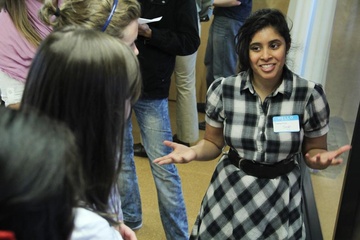Platonic no more. According to a recent study published in Scientific American, we’re hot for our friends. The study, conducted by researchers at University of Wisconsin-Eau Claire, examined 88 pairs of opposite-sex heterosexual friends and found that men were more likely to be attracted to their female friends than women to their male friends. Males were also more likely to see this attraction as mutual, an observation FM made well before the Scientific American.
FM wanted a Harvard opinion on this study and consulted Social Studies lecturer Bonnie M. Talbert, who teaches Freshman Seminar 47p: “Just Friends: I Don’t Love You Like That.”
Talbert quickly noted that men and women could just be friends and, when asked about possible evolutionary explanations for the findings, Talbert tilted her head back and chuckled. “Evolutionary claims about mating behavior in general are subject to a lot of challenge. In this study of only 88 pairs, there isn’t enough data to warrant evolutionary and universal claims about human behavior,” Talbert said.
Using evolutionary psychology, Talbert outlined two problems with these conclusions. First, there is not much known about the savanna, the environment in which our brains and human instincts evolved when we were still in tribal societies. In turn, it is unfeasible to make broad assumptions about the evolutionary origins of our behavior. Second, even if certain genes were expressed in the savanna, that doesn’t account for current radically different environments. “It’s almost too simple to say that men were and are promiscuous and that evolution proves this,” Talbert explained.
Talbert also noted that an analysis of our popular culture is critical to a study on sexual attraction between friends. “You need seriously to consider rivaling hypotheses. For example, there are many romantic comedies about friends becoming involved, and that’s what you want in a movie—you want sparks, the dramatic tension. These narratives have seeped into our culture and have certainly influenced the nature of our relationships,” Talbert said.
“I don’t think that the researchers were trying to imply something sinister about friendships, but I’m afraid that people will question their friendships and think that they are false or inauthentic, ” Talbert cautioned. “Studies like this could reinforce a dangerous stereotype in which men only value women insofar as their possible objects of their sexual desires, and we should push back against that.” Moral of the story? Billy Crystal is 23 years ahead of the Scientific American, and we’re still caught up in Meg Ryan’s hair—and the happy ending.




